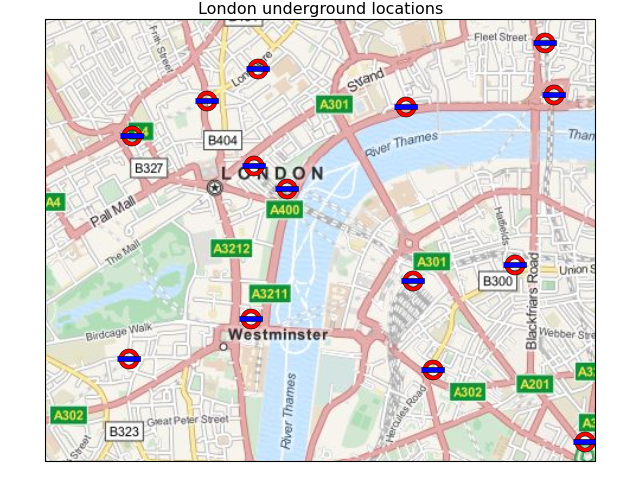"""
Produces a map showing London Underground station locations with high
resolution background imagery provided by MapQuest.
"""
from matplotlib.path import Path
import matplotlib.pyplot as plt
import numpy as np
import cartopy.crs as ccrs
from cartopy.io.img_tiles import MapQuestOSM
def tube_locations():
"""
Returns an (n, 2) array of selected London Tube locations in Ordnance
Survey GB coordinates.
Source: http://www.doogal.co.uk/london_stations.php
"""
return np.array([[531738., 180890.], [532379., 179734.],
[531096., 181642.], [530234., 180492.],
[531688., 181150.], [530242., 180982.],
[531940., 179144.], [530406., 180380.],
[529012., 180283.], [530553., 181488.],
[531165., 179489.], [529987., 180812.],
[532347., 180962.], [529102., 181227.],
[529612., 180625.], [531566., 180025.],
[529629., 179503.], [532105., 181261.],
[530995., 180810.], [529774., 181354.],
[528941., 179131.], [531050., 179933.],
[530240., 179718.]])
def main():
imagery = MapQuestOSM()
ax = plt.axes(projection=imagery.crs)
ax.set_extent((-0.14, -0.1, 51.495, 51.515))
# Construct concentric circles and a rectangle,
# suitable for a London Underground logo.
theta = np.linspace(0, 2 * np.pi, 100)
circle_verts = np.vstack([np.sin(theta), np.cos(theta)]).T
concentric_circle = Path.make_compound_path(Path(circle_verts[::-1]),
Path(circle_verts * 0.6))
rectangle = Path([[-1.1, -0.2], [1, -0.2], [1, 0.3], [-1.1, 0.3]])
# Add the imagery to the map.
ax.add_image(imagery, 14)
# Plot the locations twice, first with the red concentric circles,
# then with the blue rectangle.
xs, ys = tube_locations().T
plt.plot(xs, ys, transform=ccrs.OSGB(),
marker=concentric_circle, color='red', markersize=9,
linestyle='')
plt.plot(xs, ys, transform=ccrs.OSGB(),
marker=rectangle, color='blue', markersize=11,
linestyle='')
plt.title('London underground locations')
plt.show()
if __name__ == '__main__':
main()
